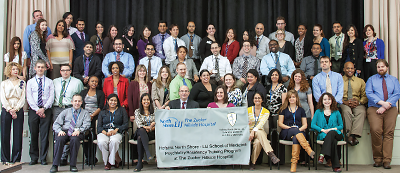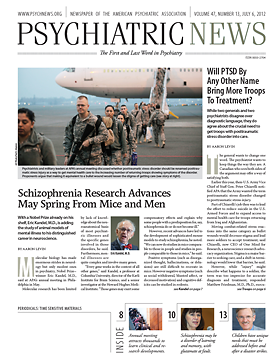One psychiatry residency program in New York is setting a high bar for APA membership among residency programs nationwide.
The Hofstra North Shore-LIJ School of Medicine at the Zucker Hillside Hospital psychiatry residency program has boasted perfect rates of APA membership for four consecutive years now, according to APA’s District Branch/State Association Relations Office.
What makes this particular milestone noteworthy as far as residency programs’ achieving perfect membership rates is the program’s size: this year, 68 psychiatry residents are training in the program, according to Bruce Levy, M.D., who is director of education and training.
“I think it is important for psychiatry residents to join APA and participate in its activities,” John Kane, M.D., told Psychiatric News. Kane is chair of psychiatry at Zucker Hillside Hospital. “Doing so facilitates their training and helps them not only to keep abreast of the broad range of issues that will affect their careers, but also to have a voice in them,” he noted.
Psychiatry residency training programs with perfect rates of APA membership earn a position in APA’s 100% Club, which entitles them to a certificate of recognition; a free online subscription to APA’s clinical review and self-assessment journal, Focus: The Journal of Lifelong Learning, for each trainee; and a gift certificate for a textbook from American Psychiatric Publishing.
Levy told Psychiatric News that the psychiatry residents at the Zucker Hillside Hospital regularly interact with faculty and program leaders who have been active in APA for many years, and this has likely informed their own views of APA membership and its benefits. Levy was one of the original APA Falk Fellows in the mid-1970s. “At the time, I was fortunate enough to be chosen for this fellowship, which enabled me to be a voting member of an APA component for two years, and the experience made quite an impression on me,” he said.
Since that time, Levy has maintained an active level of involvement with APA, serving as a member of the Council on Medical Education and Lifelong Learning and overseeing residents who have been involved with various APA fellowship programs over the years.
Levy noted that the Zucker Hillside Hospital, the whole of the residency program, and the residents themselves straddle two APA district branches—the Greater Long Island Psychiatric Society and the Queens County Psychiatric Society, giving residents abundant opportunity to be involved in APA at the local level. For instance, the Queens Psychiatric Society each year holds a paper contest, and area psychiatry residents are challenged to submit original research, a literature review, or a case presentation. Finalists present their work at a district branch meeting, and the winner is honored at the district branch’s annual dinner. The Zucker Hillside Hospital psychiatry residents are regularly chosen to present, Levy noted.
Chief resident Hillary Harrison, M.D., noted that many of the residents attend workshops organized by the local district branches that are helpful to early career psychiatrists and include information about practicing in various settings.
Of course, the Zucker Hillside Hospital psychiatry residents regularly attend APA’s annual meeting as well and benefit from its wide spectrum of educational offerings. “Our residents are blown away by the size and the scope of the educational model offered by APA and excited about the opportunities offered to them as they embark on their careers,” said Harrison.
Other psychiatry residency training programs achieving four or more consecutive years in the 100% Club include Albany Medical College, Georgia Health Sciences University, Jamaica Hospital Medical Center, San Mateo County Behavioral Health and Recovery Services, University of Kansas School of Medicine-Wichita, and Wake Forest University School of Medicine.

